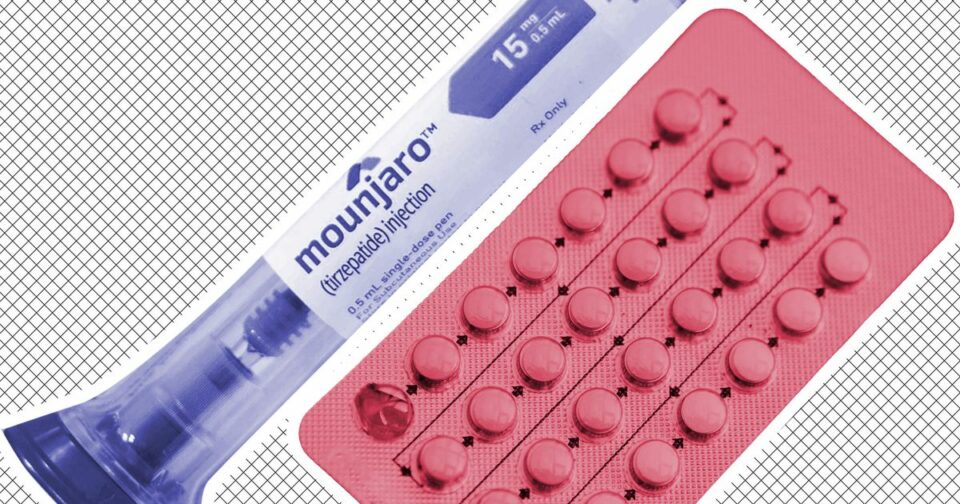
In the past few weeks, there’s been a wave of stories about people unexpectedly getting pregnant while using drugs like Ozempic and Mounjaro. Part of the apparent boom may be because losing weight can improve your fertility by regulating your menstrual cycle, especially if you have PCOS. But it may also be true that Mounjaro can make birth-control pills less effective.
Studies have found that tirzepatide, which is marketed as both Mounjaro and Zepbound, affects how birth-control pills are absorbed in the body, potentially leading to unplanned pregnancies. Tirzepatide’s drug label explicitly warns patients on the pill to switch to non-oral contraception or use backup forms of birth control, but there’s still a lot we don’t know about how these drugs interact with contraception. The Cut spoke with three OB/GYNs — Dr. Ann Frisse of Mount Sinai’s Division of Complex Family Planning, Dr. James A. Grifo of NYU Langone’s Fertility Center, and Dr. Rachel A. McConnell of Columbia University Fertility Center — to find out more.
How do weight-loss drugs make birth control less effective?
Tirzepatide leads to weight loss by slowing down the amount of time it takes for food to leave the body, and this mechanism of delayed gastric emptying may also impact how birth-control pills are metabolized. A study evaluating the link between tirzepatide, delayed gastric emptying, and birth control found that the amount of oral contraceptives in the body decreased by roughly 20 percent after a single 5 milligram dose of tirzepatide.
Because tirzepatide’s effect on birth-control absorption is strongest after your first injection and each time you up your dosage, the FDA recommends either switching to non-oral birth control (such as an IUD) or adding in a barrier method (like condoms) for at least four weeks after starting Mounjaro or increasing your dose.
However, semaglutide (Ozempic and Wegovy) doesn’t appear to decrease the effectiveness of birth control, according to Dr. Frisse. “The data is sparse, but patients on Ozempic can be assured their pills are probably working well,” she says.
It’s not exactly clear why this is an issue with tirzepatide and not with semaglutide. We have very, very few studies here,” says Dr. Frisse. Dr. Grifo agrees. “I don’t think anyone really knows the mechanism,” he says. “There’s just not enough information.”
One possible theory, according to Dr. McConnell, is that this has something to do with the fact that tirzepatides work on two gut hormones, GLP-1, which regulates blood sugar and appetite, and GIP, which secretes insulin, while semaglutides like Ozempic and Wegovy only work on the former.
Are other forms of contraception impacted?
Only birth-control pills are metabolized through the stomach, so other forms of birth control, like implants or IUDs, aren’t affected by taking tirzepatide and can be used instead, Dr. McConnell says. It’s unclear if Plan B might be affected, but Dr. Grifo advises caution just in case. “Absorption may be a problem, same as with birth-control pills,” he says.
Should my doctor be talking to me about this?
Yes, they should. But if your prescribing physician hasn’t spoken to you about contraception before going on Mounjaro, make sure you initiate those conversations. Your doctor should be talking to you about your medical history, your reproductive plans, what you have tried in terms of birth control in the past, and what you have and haven’t liked.
Could weight-loss drugs affect other medications, too?
According to Dr. McConnell, there haven’t been reports of weight-loss drugs interfering with other kinds of medications. But she wouldn’t rule out the possibility. “Anything you’re taking orally, you have to wonder if it may have an impact,” she says. If you have questions about how these drugs might interact with other prescriptions, make sure you have a discussion with your doctor about your concerns.
What else do we know about how these drugs affect fertility?
Birth-control efficacy aside, if your fertility has been negatively impacted by being overweight, then losing weight — whether because of using Ozempic, Mounjaro, or some other method — can improve your chances of getting pregnant, according to Dr. Frisse. These drugs, she adds, can especially improve fertility outcomes for overweight patients who don’t ovulate as a result of PCOS.
“When you have a patient with a high BMI and also polycystic ovaries and you lower their BMI, they start to ovulate,” says Dr. Grifo. “They weren’t able to get pregnant, and now all of a sudden they are.”
What do we know about weight-loss drugs and pregnancy?
The FDA recommends going off these drugs at least two months before trying to get pregnant. The agency is tracking information about people who get pregnant on these drugs, which could hopefully mean we’ll have more thorough data in the future. In the meantime, Dr. Grifo says, what is clear is that doctors don’t know if these medications are safe during pregnancy or how they impact babies. While animal studies suggest semaglutides might cause birth defects, Dr. Grifo says they don’t necessarily predict what happens in humans. He advises patients to avoid unknowns in the first trimester, the riskiest time of pregnancy. “We counsel patients: Don’t do anything we don’t know the answer to, because you may be taking risks we can’t quantify.”
By Bindu Bansinath , 2024-04-09 18:28:56
Source link


